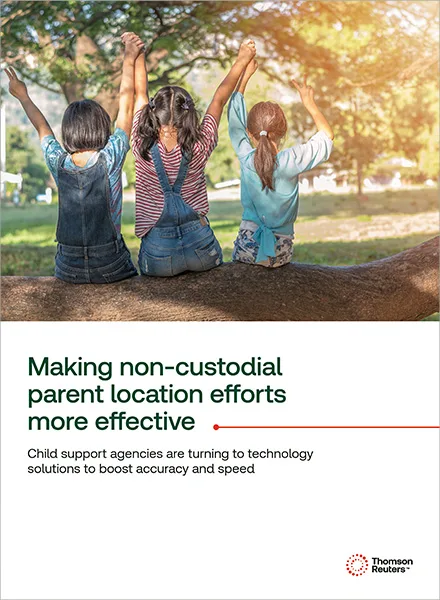Discover how real-time data can help with the locating process and improve the lives of families
Jump to ↓
| Challenges in child support orders |
| How real-time data helps every step of the way |
| Enhanced technology when you need it most |
| Final words |
Let there be no doubt about it: The work that government agency professionals involved in child support cases perform is essential to the well-being of millions of U.S. children. The federal child support program has been successful in helping families across the country provide more stability for their children for nearly 50 years. In fiscal year 2022 alone, the program served 12.8 million children—nearly one in five U.S. kids—collecting $30.5 billion in child support payments.
Even with that success rate, the federal Office of Child Support Enforcement (OCSE) reported that in 2021 approximately $114 billion in child support goes uncollected in the U.S. each year. Much of that is due to the difficulties state child support agencies frequently face in tracking down non-custodial parents (NCPs). NCPs are crucial to the financial and emotional stability of custodial parents and the well-being of their kids.
But for a great many reasons, NCPs can be hard to find for many reasons. Could be that they’re trying to evade payments. Sometimes they feel like it’s unfair. Or sometimes they don’t know they owe child support. In any case, it’s the child support professional’s job to find them and notify them of their obligations.
Child support professionals love the work they do. That’s because they help support families and children to live better lives and stay together. At the same time, this worthy mission brings with it significant burdens. Child support professionals need to manage heavy caseloads, often while meeting crucial (and seemingly endless) deadlines.
How can these professionals meet these challenges and thus fulfill their mission? What they need is access to comprehensive, real-time data sources that can improve the locating process and allow child support professionals to move forward with enforcement and close cases. It’s not overstating it to say that real-time data is fundamental to successful NCP location and support enforcement.
Challenges in child support orders
State child support professionals need to communicate with NCPs to establish and enforce support orders. But as noted, they aren’t always easy to locate. There are a number of challenges associated with this difficulty.
Outdated information
For instance, in many cases, NCPs move frequently, and they often reside far from their offspring, including in a different state. This can mean that the contact information state child support agencies must work with is outdated. In some cases, the NCP has been arrested or is already incarcerated, and incomplete booking information can add to the difficulty of tracking their location. It’s clear that real-time data would provide child support professionals with quicker, more accurate searches.
Older technology
Those aren’t the only challenges. State child support agencies often are tripped up by the very technology that’s supposed to help them. Older, outmoded tech platforms can slow down location efforts instead of speeding them up. Agencies often need to search multiple sources to find information about an NCP’s location status. Additionally, state and local governments may use different database software, which frequently aren’t able to communicate with each other. Different sources also may deliver different information, which can make it extremely difficult to determine what location data (if any) is correct.
Lack of access to real-time data
Finally, a lack of access to real-time location data can hinder NCP location efforts, particularly if the custodial parent and the NCP live far apart. If both the custodial parent and the NCP reside in the same state, enforcing the NCP’s court-ordered child support payments is relatively straightforward. If the two parents live in different states, the situation can be more complex. That’s largely because each state determines which court within a state has jurisdiction to consider the issue of child support. While most states are willing to cooperate with the custodial parent’s home state to enforce the NCP’s child support obligations, that’s not always the case.
But again, the bigger issue for home-state child support agencies is ready access to up-to-date interstate databases that can help locate NCPs.
 |
How real-time data helps every step of the way
The first step in the process of obtaining child support payments begins, of course, with finding the noncompliant parent. Accessing real-time data can solve a great many of the challenges state support agencies face when locating NCPs, establishing orders, and enforcing child support payments.
Locating NCPs
What sources of data can child support agencies use to locate NCPs? Child support professionals are undoubtedly familiar with most of them. They include public records, license plate recognition data, incarceration records, bank account headers, and listings of professional licenses. Social media accounts also can provide useful information, as can tax records that might reveal out-of-state income.
Child support professionals can also work in cooperation with agencies in other states, accessing interstate data to improve support orders. Under the federal Uniform Interstate Support Act (UIFSA), states are required to work together to enforce child support orders when custodial parents and NCPs don’t reside in the same state.
Additionally, for child support professionals to close cases in a timely manner, and help as many families as possible, access to real-time data is essential. In addition to providing that access, a truly useful technology tool should include an alert system that informs the child support professional whenever location data for an NCP is updated in public records. Real-time alerts can streamline the professional’s heavy workload.
Establishing support orders
This step includes determining that the NCP is indeed the parent. Thanks to real-time data locating the NCP, the child support professional can then calculate the payment based on support guidelines and benefit program requirements.
These data sources may include:
- DNA
- Birth certificates
- Marriage certificates
- Divorce papers
- Court orders
- Connecting and working with family relations of the NCP
Enforcing payments
By using real-time data to determine an NCP’s location and establishing support orders, child support agencies can then make use of a number of resources for collecting or enforcing payments.
They include:
- Income withholding
- Tax refund intercepts
- Driver’s license suspension
- Passport denial
- Liens on property
- Contempt of court proceedings
Enhanced technology when you need it most
Here’s a real-life example of how digital technology and real-time data helped one state agency locate an elusive NCP. The Child Support Division in Lake County, Indiana, had been trying for more than a year to find an NCP whose child had medical problems that required his court-ordered financial support. The investigator tried every avenue she could think of, but she kept running into dead ends. Even the NCP’s social media accounts revealed nothing—or so it seemed at first.
Then one day, the NCP posted a video of his beautifully restored classic car on one of his social media accounts. The final shot revealed a portion of the car’s license plate. Using Thomson Reuters CLEAR, a digitally based public records investigation tool, the investigator entered his name, the state where the license plate was issued, and the partial plate number. CLEAR quickly revealed the details of the vehicle—including the owner’s address. This information allowed Lake County to serve the NCP with court documents.
 |
|
Samantha Eriks
Lake County Child Support in Indiana
Finding NCPs has long been a complex challenge for state child support agencies. What’s more, agencies often struggle with understaffing. In response, more and more child support professionals are seeking digital technology tools that can help them better engage best practices of accuracy and speed in their work. Digital technology also can boost collaboration between child support agencies and law enforcement, which can be critical to finding an NCP. By providing access to real-time location data quickly and efficiently, technology solutions such as Thomson Reuters CLEAR can help agencies establish and enforce child support orders and close cases.
Final words
State child support agencies are performing a crucial service to families and society. That’s more reason for them to have access to real-time data—and receive that access in a timely manner.
Technology tools designed to access real-time location data help children and custodial parents more quickly receive the financial support they need. They also allow child support professionals to close cases faster, thus allowing them to serve more families.
Child support professionals can learn more about how they can uncover real-time data and thus improve their location and enforcement efforts by visiting the Thomson Reuters child support solutions page.
 |
Thomson Reuters is not a consumer reporting agency and none of its services or the data contained therein constitute a ‘consumer report’ as such term is defined in the Federal Fair Credit Reporting Act (FCRA), 15 U.S.C. sec. 1681 et seq. The data provided to you may not be used as a factor in consumer debt collection decisioning, establishing a consumer’s eligibility for credit, insurance, employment, government benefits, or housing, or for any other purpose authorized under the FCRA. By accessing one of our services, you agree not to use the service or data for any purpose authorized under the FCRA or in relation to taking an adverse action relating to a consumer application.







